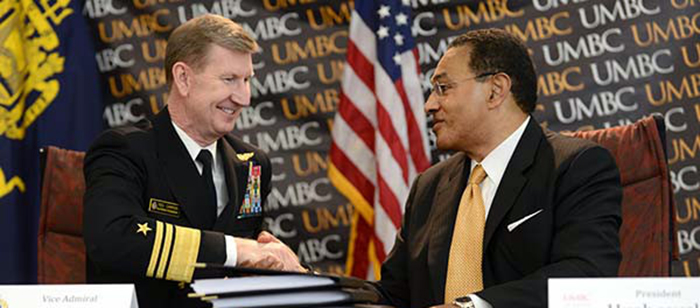UMBC and Naval Academy collaborate on cybersecurity research and education

U.S. Naval Academy Superintendent Vice Adm. Ted Carter signed a Cooperative Research Acquisition and Development Agreement (CRADA) with University of Maryland, Baltimore County (UMBC) President Freeman Hrabowski April 21st on the UMBC campus. This agreement will support future partnerships between the two schools, beginning with five cyber security research projects from teams of faculty from both institutions.
This collaboration has its roots from when Chief of Naval Operations, Adm. Jonathan Greenert, visited the University of Maryland, Baltimore County (UMBC), in February 2014. During the visit Greenert met with Hrabowski to discuss ways to work together on Science, Technology, Engineering and Math (STEM) initiatives. This initial visit between the two illuminated the institutions’ mutual strengths and interests in cybersecurity.
The initial cyber collaborative projects between the USNA and UMBC will involve areas from tactile authentication for mobile devices to detecting anomalies in cyber-physical systems to securing cloud services using policy-based approaches.
“I wanted to do this since I assumed the position of Superintendent last year,” said Carter, from the UMBC campus. “To partner with a school like UMBC is a great opportunity, particularly a school represented with so many opportunities for woman, international students and minorities.”
The Naval Academy continues to take steps to ensure future graduates are invested with the skills and knowledge necessary to operate in an emerging cyber security environment. The academy is the only U.S. institution of higher learning that has mandatory cyber security classes. The baseline is to provide every academy graduate with an understanding of the cyber domain and how it impacts their commands and their ability to conduct their missions.
The academy also now offers a cyber operations major, an interdisciplinary course of study that covers a wide range of cyber-related operations, both technical and non-technical. And, in December 2014, Congress approved funding for a dedicated building to house USNA's Center for Cyber Security Studies.
"I predict 30 years from now, what we did here (at the CRADA signing) will be vital to national defense," said Carter.
Reprinted from an article by the Naval Academy public affairs department.
Posted: April 23, 2015, 1:34 PM